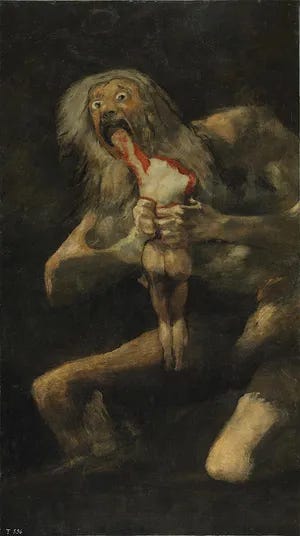a 3 am self-dialogue on fear.
also a preamble to an upcoming 2 part essay on fear, suffering, consciousness and ai???
prologue:
goya's "saturn devouring his son" is perfect precisely because it wasn't meant to be seen - painted directly onto the walls of his house during his darkest period. like this dialogue, it's an act of private, brutal self-examination made visible. the painting embodies the central thesis about fear revealing what we actually value. saturn's terror isn't abstract - it's the specific fear of losing power, relevance, legacy. his wide, haunted eyes show someone who's discovered that his carefully constructed identity (the eternal king, the untouchable father) is built on sand. fear has stripped away every pretension and revealed his core truth: he's terrified of being replaced. what makes it devastating is that saturn becomes the very thing he fears: destructive, monstrous, self-defeating. his attempt to avoid his fate ensures it. the painting doesn't let him lie about what he values most, just like fear doesn't let any of us lie when everything's on the line.

what emotion tells you the truth about who you are?
fear. it's the only one you can't perform or intellectualise away. love gets dressed up in instagram captions, anger becomes righteous indignation, joy gets amplified for social media. but fear doesn't care about your personal brand. when you're genuinely afraid, you discover what you actually value versus what you claim to value.
why do we hate it so much?
because fear threatens the carefully constructed stories we tell about ourselves. it's the ultimate truth-teller in a world obsessed with narrative control. every self-help guru wants you to "overcome" it precisely because it exposes the gap between who you think you are and who you actually are.
so can i love fear?
you can say it, but you'd be lying, and fear would expose that lie immediately. you cannot love fear because love requires openness and expansion whilst fear exists to make you contract and protect. they're neurologically opposite forces.
what you can love is what fear reveals: the truth, the clarity, the stripping away of bullshit. you can respect fear like a harsh but honest friend. but loving fear itself is like saying you love drowning because it teaches you to value air(it makes no sense, innit?)
how do i figure out what i'm afraid of?
stop asking what you're afraid of and start paying attention to what you're avoiding. fear operates through the elaborate architecture of avoidance you've built without realising it.
look at your patterns of procrastination. what conversations do you never quite have? what opportunities do you find reasons not to pursue? what parts of yourself do you never examine too closely? fear lives in the gaps between your intentions and your actions.
watch what makes you disproportionately angry. rage is often fear wearing a more socially acceptable mask. pay attention to your physical reactions: chest tightening, suddenly checking your phone, changing the subject. these aren't random; they're fear's early warning system.
how do i notice these things?
stop feeding the noise. the mind isn't naturally loud; you've trained it to be a constant chatterbox because silence terrifies you more than whatever you're avoiding.
sit for ten minutes doing absolutely nothing. don't meditate, don't breathe deeply, don't try to be mindful. just be aggressively, uncomfortably bored. your mind will panic and throw every distraction at you. don't fight the noise; just don't feed it by engaging.
the silence isn't something you create. it's what remains when you stop participating in your mind's desperate attempts to avoid the present moment. most people never experience real quiet because they're terrified of what they might find there.
what's the point?
fear is the only emotion that insists on truth(and boy do i love the concept of truth… more on that later). it doesn't care about your five-year plan or personal development goals. it cares about what's threatening what you actually value, often before you're conscious of it yourself.
the most profound question isn't "what do you love?" or "what makes you happy?" it's "what are you afraid of?" because unlike every other emotion, fear won't let you lie about the answer.
footnotes:
a dissection of fear.
kendrick lamar's "fear." dissects his terrors across three life stages: at seven, fearing his mother's discipline and the chaos of poverty; at seventeen, fearing the hundred ways he might die in his neighbourhood; at twenty-seven, fearing the loss of success, creativity, and authentic connection. each verse reveals what he actually values beneath the surface - safety, survival, artistic integrity, love. the song works because he refuses to intellectualise or romanticise these fears. he simply names them, and in doing so, precisely maps his truth.
fear is the only emotion that insists on truth



